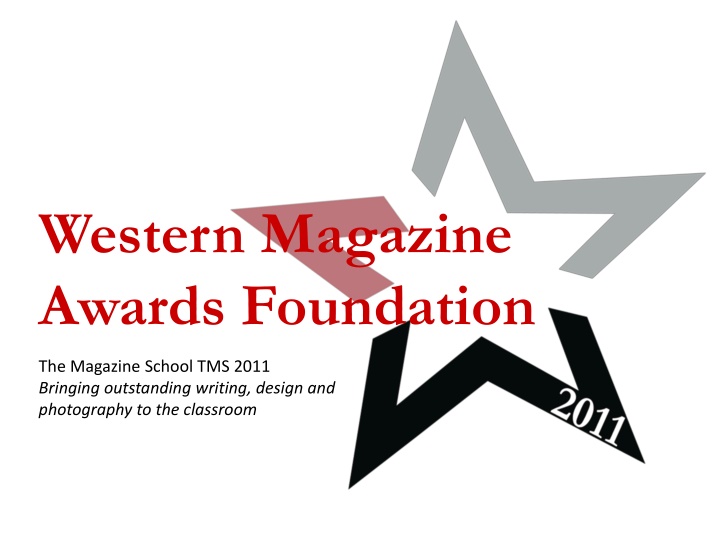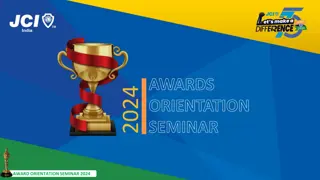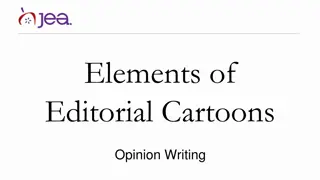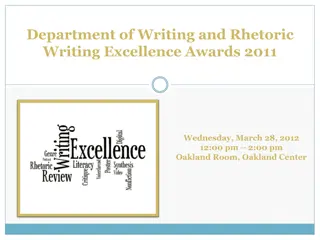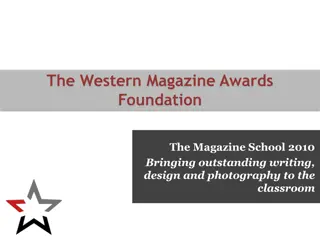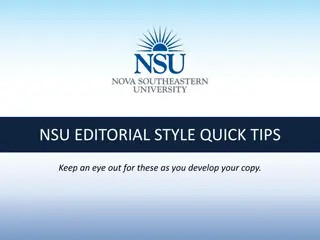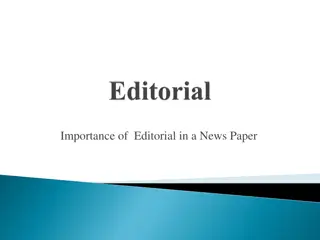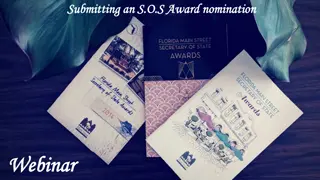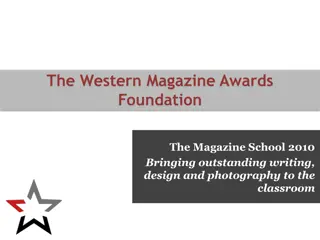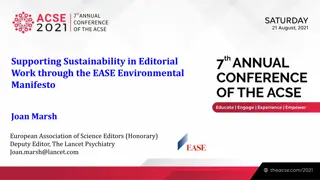Western Magazine Awards Foundation: Recognizing Excellence in Editorial Work and Design
The Western Magazine Awards Foundation presents The Magazine School TMS 2011, bringing outstanding writing, design, and photography to the classroom. Featuring finalists and winners such as Beijing Notes by Chuqiao Yang, the Foundation celebrates excellence in Western Canadian editorial work and design. Dive into the world of Grain Magazine, a literary quarterly publishing engaging writing and art. Meet author Chuqiao Yang and discover her poetic journey from Beijing to Saskatoon, showcasing her talent in poetry and journalism.
Download Presentation

Please find below an Image/Link to download the presentation.
The content on the website is provided AS IS for your information and personal use only. It may not be sold, licensed, or shared on other websites without obtaining consent from the author.If you encounter any issues during the download, it is possible that the publisher has removed the file from their server.
You are allowed to download the files provided on this website for personal or commercial use, subject to the condition that they are used lawfully. All files are the property of their respective owners.
The content on the website is provided AS IS for your information and personal use only. It may not be sold, licensed, or shared on other websites without obtaining consent from the author.
E N D
Presentation Transcript
Western Magazine Awards Foundation The Magazine School TMS 2011 Bringing outstanding writing, design and photography to the classroom
bullet_point.png Western Magazine Awards Foundation An annual awards program recognizing excellence in Western Canadian editorial work and design. The Magazine School TMS 2011 is a project of the Western Magazine Awards Foundation. It provides classroom material to instructors and professors.
The Western Magazine Award Best Article Saskatchewan
Finalists Chuqiao (Teresa) Yang, Beijing Notes, Grain Magazine Noel Busse, The Great Battle of Moose Jaw, The Crow Darrell Noakes, Sleeping on Snow, Westworld John Campbell, Where the Buffalo Roam, Westworld
And the winner is: Beijing Notes Chuqiao (Teresa) Yang Grain Magazine
Grain, the journal of eclectic writing, is a literary quarterly that publishes engaging, diverse and challenging writing and art by some of the best Canadian and international writers and artists. Every issue features superb new writing from both developing and established writers. Grain Magazine publishes poetry, fiction and literary non-fiction, and includes some visual art Published by the Saskatchewan Writers Guild Founded in 1973 Subscription: $35 per year bullet_point.png Click here for Grain website Click here for Grain website
Born in Beijing and moved to Saskatoon at age 2 Primarily a poet, was named the Youth Write winner for poetry in 2008 and was the youngest participant in the CBC Radio National Poetry Face-Off Started studying journalism at the University of Ottawa, then switched to international development and global studies Meet the author: Chuqiao (Teresa) Yang, 19 Beijing Notes was her first magazine article bullet_point.png Click here
The authors name I publish under the name Chuqiao simply because it is my given name. I changed my name to Teresa when I was younger to make sure that my name was something pronounceable and easy for people to say. It's really clich , but I publish under Chuqiao because if I am going to write, I shouldn't be simplifying anything in the process, including me. Great metaphor, eh? Teresa Yang
The editor pushes esthetic boundaries I wasn t expecting anything other than an engaging, distinctive piece. I get the sense that there is often the perception that writing from Saskatchewan is insular, focused more on rural landscape than urban cacophony, on politics that are more fencepost than global. Sadly, this is often the case, and is an esthetic that has traditionally been to some degree cultivated in this province. A piece such as Teresa s certainly upends that tendency and, I hope, skews that perception. Sylvia Legris, Grain editor
The writer journals I happened to be writing a journal at the time, and I just compiled a couple of the excerpts from the journal that I thought were interesting. Teresa Yang
Yang overcomes fear I was so hesitant to write this article; I felt so uncomfortable even doing it because I was scared I was going to misrepresent everything and I was so scared it was going to come out like the stuff that a lot of Western journalists write about, where it s a completely misrepresented version because there is no cultural understanding. Teresa Yang
Beijing Notes lead has five sections May 12 Subway station construction upheaves streets, buildings that five years earlier had a purpose. Everything is changing. In China, expect to see torn down buildings, strange grey shacks between skyscrapers, a cemetery filled with farmers alongside the train. Dirty children, more buildings. Expect rivers and miles and miles of mountain and then a stream filled with garbage. Remember that the darker the women, the harder their labour in the fields. The darker the children, the further they are from the city, and the longer the bike ride under the sun.
Lead section #2 If you are unfamiliar with this place, the best way to get a succinct view of China is to sit at a window on a train and stare until you reach your destination.
Story theme Just as history fascinates others, the people I see are tangible and fascinate me. This sentence comes near the end of Beijing Notes.
People walking A bow legged woman walked by my grandmother and me. She swayed like a little boat in the water. My grandmother was watching her. My walk is prettier than that, right? she asked.
People peddling What always gets to me are the people peddling wooden carts that look like they are going to break. The women with their umbrellas in sunny weather.
People peddling their children for marriage I walked into a courtyard filled with old people with posters, little booklets containing names, ages and heights. That was all I could understand. My aunt told me these people were parents, conferring with one another to find matchmakers for their busy children who were approaching 28 years old.
Juxtaposing imagery China is a very rapidly developing country. Even in my development courses we learn a lot about China and the reason why is the juxtaposed imagery . . . you will see peasants or farmers who are using the very basic methods of technology, the sickle or whatever, as opposed to actual tractors in the farm as you re crossing [on] a train going through the different provinces . . . You ll see a giant skyscraper in the middle of nowhere, [and] then you ll see some graveyards. It s very back and forth; it almost seems like while there is so much industrialization occurring, China is struggling to come to grips in the social sense to catch up with the times.
Making sense of China It s so modernized, it s trying to force itself into becoming . . . I think that s why it s physically stimulating to watch and be in China, because there is so much culture but at the same time there was so much noise. You can hear so much technology all over the place, but at the same time there is so much culture because it s such an old country. You d be in a temple, and it d be a very quiet, peaceful place, but then there would be thousands of tourists with cameras and cell phones, and it was so juxtaposed . . . That s why for me it felt so restless in China. Just that strange, visual explosion of ideas and thoughts of people conversing yet [not knowing] what century [they] are in . . . Especially with that excessive push for industrialization in China. Teresa Yang
Seeing China through adult eyes I think the only thing that made it a bit strange was that I was finally aware as a young adult of the differences as opposed to just a kid exploring things and going Oh wow! This place is so weird! I was a young woman, and I started picking up on the cultural differences and was surprised. Teresa Yang
The author is sized up at 19 Two women behind me said, too tall. When I turned around, they were staring at me. Damn. There is this strange need here to get married before you hit 30. Twenty-nine is considered old. It s not the same here, my cousin explained to me. Chinese women, our bodies are different. After 30, our bodies have a great deal of trouble giving birth.
Chinas population is a key theme The greater the population, it seems, the less regard for the individual the less time, space, to be an individual. I am no longer someone to be met because there are millions of others here, like me, to meet. In a city like Beijing, it seems that population, urban- ness, all of this, pushes people to be acutely aware of their need to survive; their need to make a living, somehow, in a place where everyone is always moving, always working. There is no time or place for a slower pace, a casual conversation between strangers. That can come later, perhaps.
Population and the individual I don t want to believe that after you live long enough in a massive metropolis, few things come to surprise you. No one stares at the beggar and her child on the street, the girl playing the erhu,except me.
Populations human face A man in grey clothing in a fashion district. He is a professional shoe-polisher. He flogs a tube of shoe polish shouting at people on the street that it is wu jiao, or 50 cents, for a polish. There are millions of ways here to make a living, and millions upon millions of people doing just that. My shoes, sadly, don t need to be polished.
Population survival: Xin Ku On the streets, people sprawled all day selling popsicles, shoes, toiletries I no longer stop and think how do you do this every day? There is no time for a person here to think of all the things they could be doing you must survive and provide for your offspring. Xin ku.
Writer elaborates on Xin Ku It s hard to find a direct English translation of xin ku, but it means difficult, hard-working, earnest, committed, etc. Essentially, that a person with less discipline would have perished earlier on. But you continue and your efforts go unnoticed, especially when there are millions doing what you are doing. The woman selling plastic whistles for five cents, every day, outside in weather I can t sit an hour in. The boy who is the head waiter in this dingy restaurant I m eating at. I check the time and it s late. Perhaps, too late. Xin ku.
Reflecting on writing I think when I am writing, I don t really write, I feel statements . . . I am more interested in trying to preserve a certain memory and I think it s sort of a lot better to base things on the imagery and what you can remember specifically, the physical details as opposed to the feeling. Teresa Yang
Story ending I am back from the Expo. I saw a woman club another woman in the lineup for the German pavilion. Her bra was sliding off. Two old men started to hit each other. The sweat on my body did not belong to me. I went home and drank four or five giant bottles of beer and sang a really bad rendition of a Chinese song. I think my relatives hate me.
Considering the abrupt ending I really liked it because it was the only thing in the entire article that was a direct indication of how different I was compared to my relatives in China. I m tall, I m loud mouthed, I have no common sense of how to be a decent woman, or whatever you know, being focused on getting married. So me getting extremely drunk and singing really bad versions of Chinese songs was a really good way to just wrap up the entire experience that I had in China. Teresa Yang
Editing the piece When I sent the article to the editor, it was significantly lengthier than what it was, and the editor shortened it down and made it significantly more cohesive. Teresa Yang
The editor on editing The editing wasn t that extensive. Mostly it was a process of shifting the order of some of the entries to give it a more cohesive sense of narrative without compromising Teresa's sense of spontaneity and humour. Sylvia Legris
The editor reflects Teresa is an emerging yet already astute poet. The reason her piece worked is because of her poet s attention to detail and [to] the unexpected and because of her propensity (again, the tendency of a talented poet!) to make remarkable connections between things that others might not. Sylvia Legris
Advice to writers Writers too often fall into the trap of thinking they have to model their own work after what they see published in journals and magazines. The vast majority of submissions that come to a journal like Grain are completely forgettable in their depressing sameness. Don't just learn to trust your own weirdness in your writing, embrace it, flaunt it even! Sylvia Legris
Considering layout Title font and subtitle font is Chaparral: The font is Bembo; that s the book font. Bembo was chosen by a designer before me and I liked it. It s very elegant, and for me it had a literary feel and worked well with poetry. Betsy Rosenwald, designer
Author photos are chosen Teresa shot those photos in Beijing and they were part of her journal . . . I really liked the two I chose because they had a little bit of a sense of movement. I liked the blurring and because we reproduce in black and white, I knew they would reproduce well. They didn t have a look that just said oh I shot these pictures on my vacation. Betsy Rosenwald
Credits The Magazine School TMS 2011 is a project of the Western Magazine Awards Foundation. The WMAF, along with its community partner RBC Royal Bank, is committed to the celebration of excellence and the development of tomorrow s magazine industry professionals. The WMAF acknowledges the financial support of the Government of Canada through the Canada Periodical Fund of the Department of Canadian Heritage toward project costs. The Magazine School TMS 2011 content was prepared with the assistance of Janice Paskey and Mount Royal University students Justine Rodrigues and Laura Wershler, and with the generous co-operation of the winners of the 2011 Western Magazine Awards. The Gold Award Saskatchewan was sponsored by Saskatchewan Ministry of Tourism, Parks, Culture and Sport We acknowledge the financial support of the Government of Canada through the Canada Periodical Fund (CPF) of the Department of Canadian Heritage towards our project costs.
